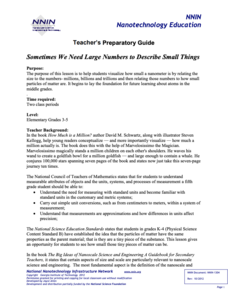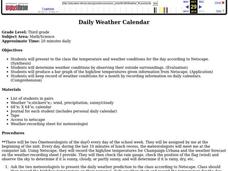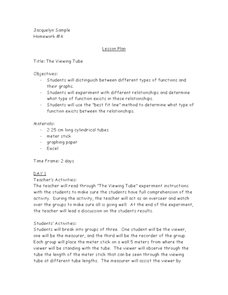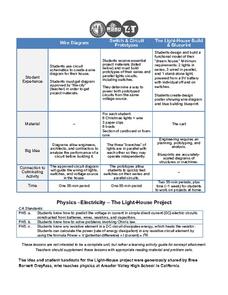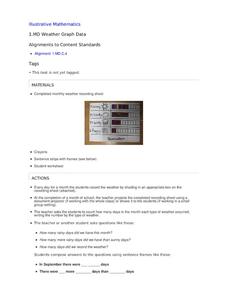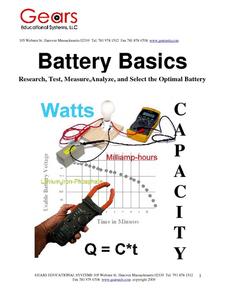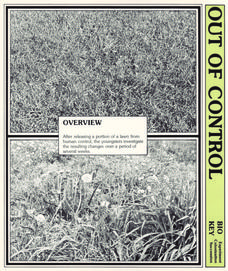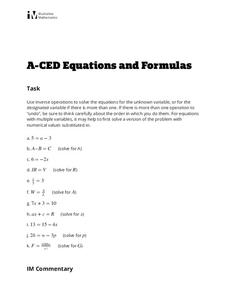National Nanotechnology Infrastructure Network
Sometimes We Need Large Numbers to Describe Small Things
String the class along to help them understand large numbers. A multi-disciplinary lesson uses literature, science, and math to look at very large numbers. Pupils conceptualize how much a million is using literature before performing a...
Curated OER
Daily Weather Calendar
Young learners will love this fun weather activity that incorporates math, science and writing. Each member of your class gets a turn becoming a meteorologist! At the end of recess, the two chosen meteorologists met the teacher at a...
Curated OER
Close Observation: Coins
Integrate math, science, and speaking/listening with a collaborative hands-on activity. Each group works with a single penny, examining it with the naked eye and recording observations. Repeat using magnifying glasses. Then repeat with a...
Curated OER
Seed Swapping
Here is a fabulous, cross-curicular lesson on seeds. Elements of science, writing, math, agricultural practices, and art are all brought into this incredibly thorough plan. Additionally, a fun whole-class game is presented, and there is...
Curated OER
The Mathematician And The Archaeologist
Students decorate clay pots and destroy them in order to learn the techniques of modern-day archaeologists and practice mathematical measurements. This is an exciting instructional activity suitable for Social Studies, Math, Science, or...
Curated OER
The Viewing Tube
Looking for an excellent lesson that incorporates math, science, and technology? Groups of three students use a viewing tube to perform an experiment, and discover how to organize their data into an Excel spreadsheet. This is a...
Curated OER
Cold, Clouds, and Snowflakes
Students explore satellite data and graphing. In this weather data analysis math and science lesson, students analyze NASA satellite data to draw conclusions about geographical areas where precipitation might have happened. Students...
Curated OER
Elizabeti's Series--Classroom Guide
Second graders explore the books in the Elizabeti Series. In this reading comprehension lesson plan, young readers discuss pre-reading focus questions about their feelings on the first day of school. They investigate the book and...
California Academy of Science
Snakes and Lizards Length and Movement
Snakes and lizards can be very tiny or very long. Your class will get out their rulers to see just how big snakes and lizards can be. They discuss several different reptiles by reading the included animal fact cards, then each small...
Trash For Teaching
The Light-House Project
Groups work together to design a lighthouse, from designing and drawing the wiring diagram, to creating prototypes of the switch and circuit, to envisioning and building a scale model along with a blueprint. By including different...
Illustrative Mathematics
Weather Graph Data
Teaching young mathematicians about collecting and analyzing data allows for a variety of fun and engaging activities. Here, children observe the weather every day for a month, recording their observations in the form of a bar graph....
Illustrative Mathematics
How Thick Is a Soda Can II?
Science, technology, and math come together in this one combination exercise. Analyzing the common soda can from both a purely mathematical perspective and a scientific angle allows for a surprisingly sophisticated comparison of...
Kenan Fellows
Determining the Atomic Mass of Elements in a Compound Using Matrices
Scholars apply concepts learned in both Algebra II and Chemistry to answer the questions on the provided worksheet. The activity allows for extra practice in both classes and helps connect concepts usually taught in isolation. The...
Curated OER
Fanning The Spark: Fostering Your Students' Creativity
Here is a packet of lessons which are designed to help you to foster your pupils' creativity. The lessons are designed to develop their fluency, flexibility, originality, and elaboration on ideas. The are built around field trips to a...
Curated OER
Scale/Ratio
Investigate the use of ratios in scale drawings. Learners scale objects up or down using ratios then find the actual size of something using ratios. They apply their knowledge of ratios as they make their own telescopes in science...
Gears Educational System
Battery Basics
In a series of activities, high schoolers research and compare batteries of different chemistries (such as nickel-cadmium), measure current and voltage, and use multimeters and math to compute their capacities. In the end, they try to...
Curated OER
Volume, Mass, and Weight
Study the difference between mass and weight. Your math group will compare the weight of an item to the amount of space that it uses. They'll then use conversion factors to find the difference between kilograms and pounds. Essential...
Curated OER
Out of Control
Students release care of a lawn. In this Science lesson plan, students observe the changes that occur when lawn maintenance is stopped. Students record data from several observations.
Curated OER
Seas in Motion
Students analyze wave movement. In this Science lesson, students use items that float to observe waves and currents. Students record and discuss their observations.
Illustrative Mathematics
US Garbage, Version 1
An interesting example of a discrete function and how it is applies to the real world. This could easily make a good collaborative lesson with an environmental science class. Practice reading a table and drawing a scatter plot make up...
Illustrative Mathematics
Equations and Formulas
Your class is asked to use inverse operations to solve eleven equations for unknown variables or to rearrange formulas to highlight a quantity of interest. By using the same reasoning as solving one- and two-step equations, algebra...
Illustrative Mathematics
Currency Exchange
Take your class on a North American adventure with a currency conversion problem. Pupils are asked to change US dollars into Canadian dollars and then to Mexican pesos. The commentary includes two solutions, converting by unit rates and...
American Statistical Association
More Confidence in Salaries in Petroleum Engineering
Making inferences isn't an exact science. Using data about salaries, learners investigate the accuracy of their inferences. Their analyses includes simulations and randomization tests as well as population means.
Las Cumbres Observatory
The Cosmic Distance Ladder: Parallax
Scientists don't have a ruler long enough to measure to the stars, so they rely on math. Scholars learn to calculate the distance from Earth to a star using the parallax method. They use angle measures from different perspectives to...
Other popular searches
- Math and Science
- Math and Science Careers
- Integrated Math and Science
- Science/ Math Games
- Math and Science Activities
- Integrating Math and Science
- +Math and Science Careers
- Math and Science Plan
- Math in Science
- Math Science
- Math and Science Lessons
- Math and Forensic Science
